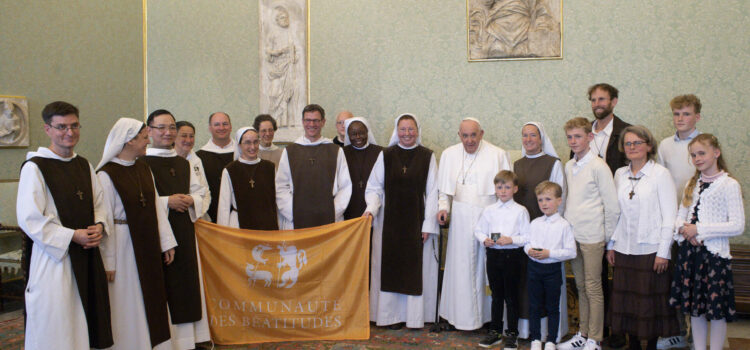Why? Today we have access to the Word of God in a book or through other means (cell phones, internet) and it is something to rejoice about. Then why should we memorize it when we can read it ? « Remember » « Keep » « do not forget » these instructions are frequent in Holy Scripture. Israel is told the following : « These commandments that I give you today are to be upon your hearts » (Deut.6,6) together with the great commandment to love God. Tobit advises his son as follows : « So now, my son, keep in mind my commandments and never let them be erased from your heart » (Tob.4,19). And, before he leaves, Jesus says to his disciples « If anyone loves me, he will keep my word » (Jn.14,23).
This Word has been compared by some Fathers to a « love letter » sent by God. Who is the smitten bride who would not end up remembering by heart the letters she receives when she has been waiting for such a long time to see, at last the face of the Beloved ?
Our time of lectio being rather short, if we want to dwell on the Word, memorizing the Word can be a way of returning to it during the day – during some manual work for instance – and let it penetrate us more. The Word we memorize dwells in us, so when we go to adoration, if we do not enter into contemplation immediately, it will help us to be present before the Lord. When our thoughts wander we can rerturn to prayer thanks to it. The Word will exercise its healing power, it will gradually replace the negative words we have recorded (without any effort !), which affect our inner life.
Sometimes it will come back to us of its own accord, like a deep song that inhabits us. It will be like the bedrock of our interior home, like a « cellar » that we can fill with « sweet scented wines, which rejoice the heart of man », according to the beautiful image of John Cassian.
Let us not forget that, if we memorize the Word of the Lord, it is in order to live in harmony with it; otherwise this work would be of little interest: “The Word is very near you, in your mouth and in your heart, that you may put it into practice” (Dt 30:14).
With regard to the one who has practiced « meditation » (in the biblical sense of « repetition », « manducation » of the Word, which permeates the memory), Father Matta El Maskine says « If he opens his mouth, the words of Scripture come out unvarnished or unaffected, and with them divine thoughts flow like waves of light, which enlighten the listener’s mind with divine knowledge, touch his heart and kindle his feelings. »
Some examples
The Desert Fathers’ memorization, an integral part of their prayer life, is impressive.
According to St Pachomius, the Word envelops the work, the meals and even the journeys of the brothers. Before being allowed to enter the monastery, the candidate, standing before the door for a few days, had to memorize first « the Lord’s prayer, and then as many psalms as he can learn » (precept 49). Once admitted he was given « twenty psalms or two epistles of the apostles to learn ; or some part of another book of the Scriptures » (precept 139). Finally, no one could stay in the monastery “without learning their letters, nor without retaining something from Scripture : at least the New Testament and the Psalter” (precept 140) !
Finally, no one could stay in the monastery without being well-read, nor without retaining something from Scripture : at least the New Testament and the Psalter” (precept 140)! Closer to home, Father Matta El Maskîne, at the origin of a contemporary revival of monasticism in Egypt, had his monks memorize the psalms, the Gospels and
the book of Isaiah. Our contexts and lifestyles are obviously very different, but we are made of the same human flesh.
How can we do it?
We have an immense memory within us, a gift from God, which no doubt, is partly unknown to ourselves ! It can be invaded by worries and anxieties of the moment, by the thousand thoughts crossing our day, but it is really there.
During Lectio, we are drawn towards a sentence, or a word, the Lord uses to speak to us today: our heart opens up and is ready to welcome and keep them more easily. According to Guillaume de Saint Thierry, « every day we must detach some morsels from our daily reading and entrust to the stomach of memory a passage that we digest better and which, called to the mouth, will be frequently ruminated ». We can also choose to memorize voluntarily, in the long run, some particularly rich texts: the «Shema Israel», the Sermon on the Mount, the discourse of Jesus after the Last Supper, etc.
It is not a question of « knowing by heart » a maximum number of texts, but of bringing them down into our heart, so that they remain life-carrying words. If this faculty has not been worked upon much, we can put it back on the road with passages that we already know more or less, or that we have memorized in the past.
Repeat them in small fragments, pronouncing them carefully, working slowly without getting discouraged. It will be enough for us to be doing it every day for a short while, to quickly taste the first fruits: among other things the happiness of keeping within us safe and stable words of love. Once the text is memorized, slowly repeating it from time to time, listening to it attentively, is certainly a means of inner unification.
What has been memorized with a rythm, a song and some gestures will be etched more deeply. This is a Jewish child’s experience when learning the Torah and rocking himself, thus writing it in his fundamental rythms ; or the experience of gestual memorization of the Word, with Marcel Jousse in particular. Everyone can do it through
singing a biblical passage he loves and giving it some rythm.
At this level, too, Mary is our model. We are told she « kept all these events in her heart », without understanding them sometimes. We doubtlessly owe to her loving memory many passages in the Gospel according to St Luke (the Annunciation, the child Jesus lost and recovered in the Temple). Let’s entrust our memory to her and ask her to guide us on this path!
In order to stay awake and fight the ennemy.
« I assure you, my brothers, that if we do not keep watch with the words of Holy Scripture at all times, the enemy will deprive us of the awe of God, and make us fear him. If an unclean thought rises in your hearts, or hatred… if you want all these thoughts to diminish in you and have no power over you, then recite in your hearts the words of Scripture ceaselessly, resolving within yourselves to walk in them.” Saint Pachomius
Quotation
« To have God firmly settled in oneself thanks to our memory » Saint Basile
To fo further…Just for today:
Books:
|
Find the previous articles in our “Life of prayer” series.
(publication edited by brothers and sisters of the Community of the Beatitudes – © rights reserved).






